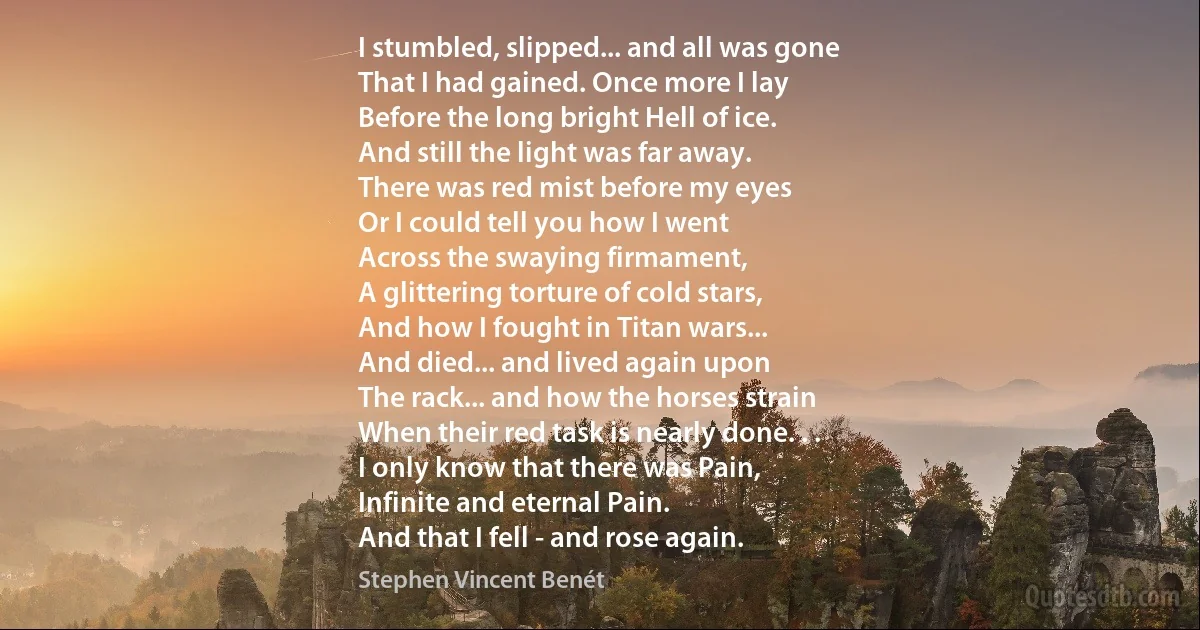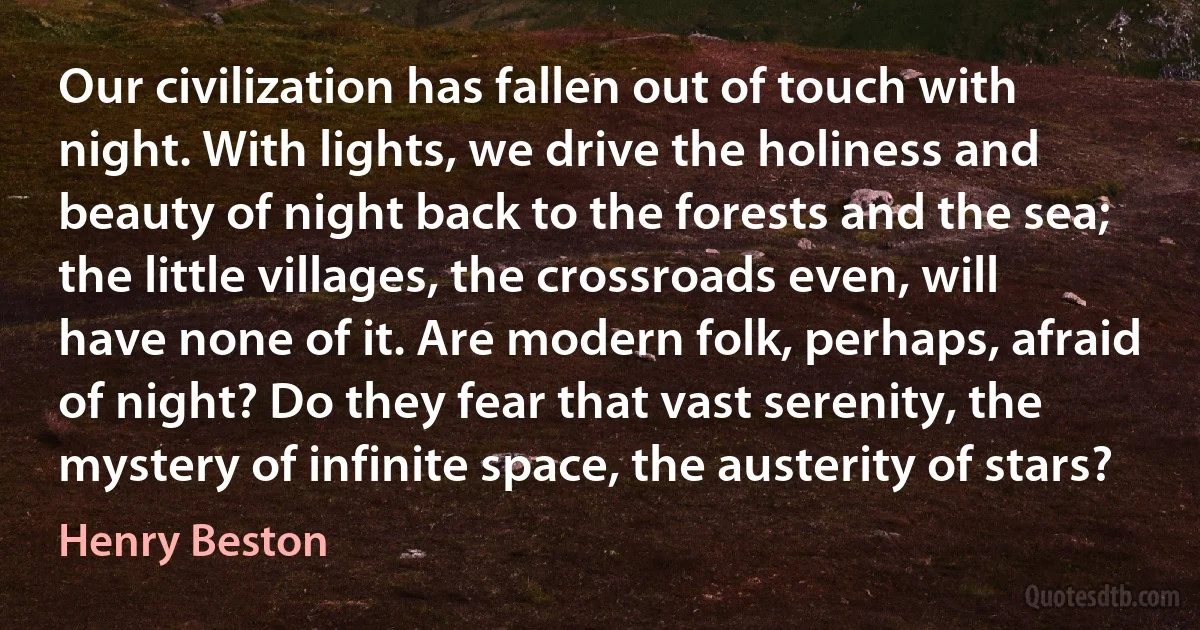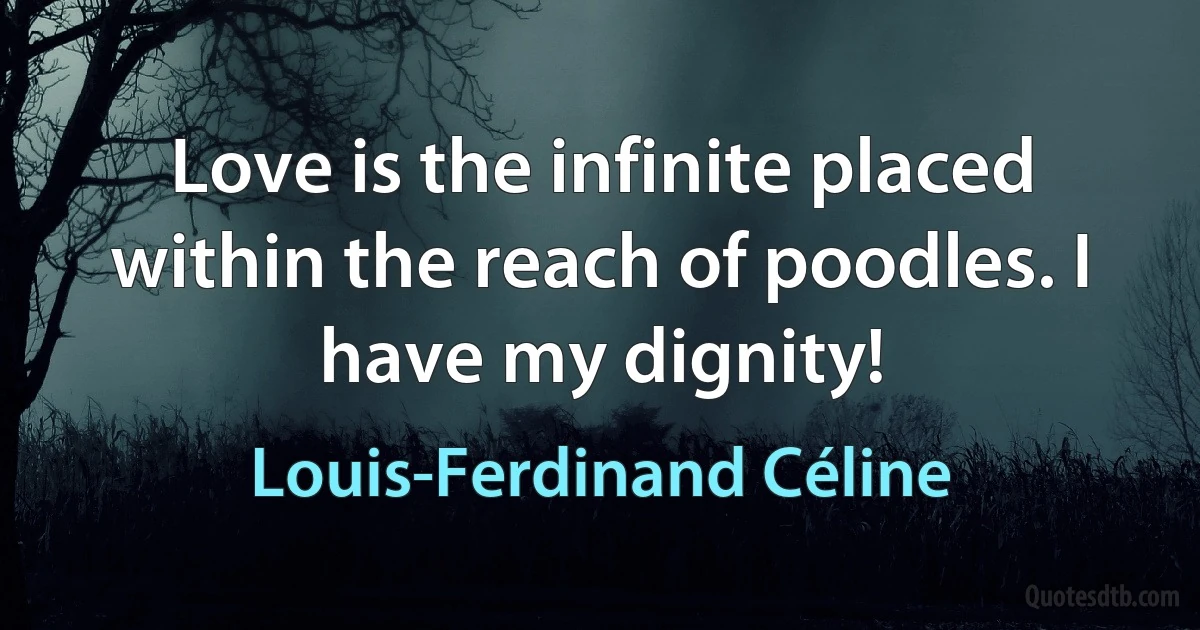Infinite Quotes - page 13
Legal plunder can be committed in an infinite number of ways. Thus we have an infinite number of plans for organizing it: tariffs, protection, benefits, subsidies, encouragements, progressive taxation, public schools, guaranteed jobs, guaranteed profits, minimum wages, a right to relief, a right to the tools of labor, free credit, and so on, and so on. All these plans as a whole - with their common aim of legal plunder - constitute socialism.

Frédéric Bastiat
It is not possible, I think, to rise from the perusal of the arguments of Clark and Spinoza without a deep conviction of the futility of all endeavors to establish, entirely à priori, the existence of an Infinite Being, His attributes, and His relation to the universe. The fundamental principle of all such speculations, viz. that whatever we can clearly conceive, must exist, fails to accomplish its end, even when its truth is admitted. For how shall the finite comprehend the infinite? Yet must the possibility of such conception be granted, and in something more than the sense of a mere withdrawal of the limits of phænomal existence, before any solid ground can be established for the knowledge, à priori, of things infinite and eternal.

George Boole
Oh, how you have longed to say that to me. You claim you trust them but you know what the people are. You know that the inner compass that should direct the soul toward justice has ossified in white men and women, north and south, unto utter uselessness through tolerating the evil of slavery. White people cannot bear the thought of sharing this country's infinite abundance with Negroes.

Thaddeus Stevens
Man is about to be an automaton; he is identifiable only in the computer. As a person of worth and creativity, as a being with an infinite potential, he retreats and battles the forces that make him inhuman.
The dissent we witness is a reaffirmation of faith in man; it is protest against living under rules and prejudices and attitudes that produce the extremes of wealth and poverty and that make us dedicated to the destruction of people through arms, bombs, and gases, and that prepare us to think alike and be submissive objects for the regime of the computer.

William O. Douglas
Now, I should like to say something else to you about the connection with music, primarily that of Bach, i. e. the Fugue or, put more simply, the canon... It has a great deal in common with my own motifs, which I make turn on various axes too. Nowadays I have such a powerful sense of relationship, of affinity, that when I am listening to Bach I frequently get inspired and feel an overwhelming instinct for his insistent rhythm, a cadence seeking something of the infinite. In the Fugue everything is based on a single motif, often consisting of just a few notes. In my work, too, everything revolves around a single closed contour..

M. C. Escher
The whole landscape lies behind the transparent gauze of the fog that now rises, drawn upwards by the sun, and as it rises, reveals the silver-spangled river, the fields, the cottages, the further scene. At last one can discern all that one could only guess at before... The sun is up! There is a peasant at the end of the field, with his wagon drawn by a yoke of oxen... Everything is bursting into life, sparkling in the full light – light, which as yet is still soft and golden. The background, simple in line and harmonious in colour, melts into the infinite expanse of sky, through the bluish, misty atmosphere. The flowers raise their heads the birds flutter hither and thither... The little rounded willows on the bank of the stream look like birds spreading their tails. It's adorable! And one paints! And paints!

Jean-Baptiste-Camille Corot
Burns's Brother Gilbert, a man of much sense and worth, has told me that Robert, in his young days, in spite of their hardship, was usually the gayest of speech; a fellow of infinite frolic, laughter, sense and heart; far pleasanter to hear there, stript cutting peats in the bog, or such like, than he ever afterwards knew him. I can well believe it. This basis of mirth, a primal element of sunshine and joyfulness, coupled with his other deep and earnest qualities, is one of the most attractive characteristics of Burns. A large fund of Hope dwells in him; spite of his tragical history, he is not a mourning man. He shakes his sorrows gallantly aside; bounds forth victorious over them.

Thomas Carlyle
The Philosopher of this age is not a Socrates, a Plato, a Hooker, or Taylor, who inculcates on men the necessity and infinite worth of moral goodness, the great truth that our happiness depends on the mind which is within us, and not on the circumstances which are without us; but a Smith, a De Lolme, a Bentham, who chiefly inculcates the reverse of this,-that our happiness depends entirely on external circumstances; nay, that the strength and dignity of the mind within us is itself the creature and consequence of these. Were the laws, the government, in good order, all were well with us; the rest would care for itself! Dissentients from this opinion, expressed or implied, are now rarely to be met with; widely and angrily as men differ in its application, the principle is admitted by all.

Thomas Carlyle
If we read History with any degree of thoughtfulness, we shall find that checks and balances of Profit and Loss have never been the grand agents with men, that they have never been roused into deep, thorough, all-pervading efforts by any computable prospect of Profit and Loss, for any visible, finite object; but always for some invisible and infinite one.

Thomas Carlyle
And yet I will venture to believe that in no time, since the beginnings of Society, was the lot of those same dumb millions of toilers so entirely unbearable as it is even in the days now passing over us. It is not to die, or even to die of hunger, that makes a man wretched; many men have died; all men must die,-the last exit of us all is in a Fire-Chariot of Pain. But it is to live miserable we know not why; to work sore and yet gain nothing; to be heart-worn, weary, yet isolated, unrelated, girt in with a cold universal Laissez-faire: it is to die slowly all our life long, imprisoned in a deaf, dead, Infinite Injustice, as in the accursed iron belly of a Phalaris' Bull! This is and remains forever intolerable to all men whom God has made. Do we wonder at French Revolutions, Chartisms, Revolts of Three Days? The times, if we will consider them, are really unexampled.

Thomas Carlyle
{Music symbolizes the loss of faith, of common belief. ] The small, intimate church is closed, the organs are dead, it is sadder than before. Only those whom fate designs for the eternal mass of infinite love remain. They compose only a very small chapel of clarity in space and time.

Louis-Ferdinand Céline
Hegel ... destroyed the illusion of the subject's being-in-itself and showed that the subject is itself an aspect of social objectivity. ... However, ... we must ask this question: is this objectivity which we have shown to be a necessary condition and which subsumes abstract subjectivity in fact the higher factor? Does it not rather remain precisely what Hegel reproached it with being in his youth, namely pure externality, the coercive collective? Does not the retreat to this supposedly higher authority signify the regression of the subject, which had earlier won its freedom only with the greatest efforts, with infinite pains?

Theodor Adorno



